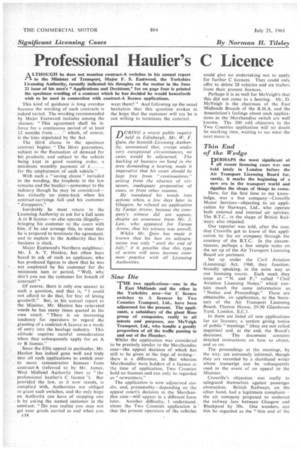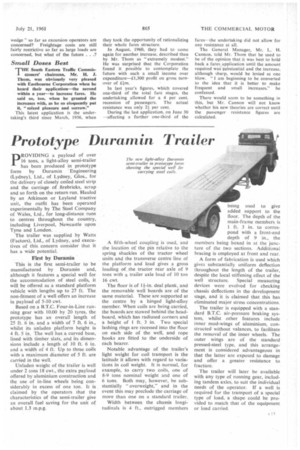Professional Haulier's C Licence
Page 50

Page 51

If you've noticed an error in this article please click here to report it so we can fix it.
ALTHOUGH he does not mention contract-A switches in his annual report to the Minister of Transport, Major F. S. Eastwood, the Yorkshire Licensing Authority, recently indicated his thoughts on the matter in the June 21 issue of his area's "Applications and Decisions," for on page four is printed the specimen wording of a contract which he has decided he would henceforth wish to be used in connection with contract-A licence applications.
This kind of guidance is long overdue because the wording of such contracts is indeed varied. The wording recommended by Major Eastwood includes among the clauses: "This agreement shall be in force for a continuous period of at least 12 months from . . ." which, of course. is the time stipulated by the Act.
The third clause in the specimen contract begins: " The Hirer guarantees subject to the fluctuation of demand for his products, and subject to the vehicle being kept in good running order, a minimum monthly payment of £ for the employment of each vehicle."
With such a "saving clause" included in the wording, the loophole in the law remains and the haulier—newcomer to the industry though he may be considered— has virtually no come-back when his contract-carryings fall and his customer "disappears."
Inevitably he must return to the Licensing Authority to ask for a full term A or B licence—or else operate illegally— bringing his customer to the court with him, if he can arrange this, to state that he is prepared to terminate the agreement. and to explain to the Authority that his business is slack.
Major Eastwood's Northern neighbour. Mr. J. A. T. Hanlon, has often been heard to ask of such an applicant, who has produced figures to show that he was not employed by his customer for the minimum sum or period, "Well, why don't you sue the customer for breach of contract?"
Of course, there is only one answer to such a question, and that is, "1 could not afford to do that, for fear of losing goodwill." But, in his annual report to the Minister, Mr. Hanlon has reiterated words he has many times quoted in his own court: "There is an increasing tendency for operators to regard the granting of a contract-A licence as a mode of entry into the haulage industry. This attitude requires careful consideration when they subsequently apply for an A or B licence."
Since the Ellis appeal in particular, Mr. Hanlon has indeed gone well and truly into all such applications to switch over to more remunerative licences from contract-A (referred to by Mr. James. West Midland Authority then as "the professional haulier's C licence But provided the law, as it now stands, is complied with, Authorities are obliged to grant such switches, and the only hope an Authority can have of stopping one is by asking the named customer in the contract: "Do you realize you may not get your goods carried as and when you c14 want them? " And following up the usual hesitation that this question evokes in the hope that the customer will say he is not willing to terminate the contract.
Sine Die
THEtwo applications—one in the East Midlands and the other in the Yorkshire area—for C licence switches to A licences by Two Counties Transport, Ltd., have been adjourned for the present. The applicants, a subsidiary of the giant Ross group of companies, really to all intents and purposes. are McVeigh Transport, Ltd., who handle a goodly proportion a all the traffic passing in and out of the Humber.
Whilst the application was considered to be precisely similar to the Merchandise case—the appeal decision of which has still to be given at the time of writing-there is a difference, in that whereas Merchandise were holders of a licence at the time of application, Two Counties hold no licences and can only be regarded as "newcomers."
The application is now adjourned sine die, and, presumably—depending on the appeal court's decision in the Merchandise case—will appear in a different form later. Another difficulty, I understand, about the Two Counties application is that the present operators of the vehicles
could give no undertaking not to apply for further C licences. They could only offer to delete 28 vehicles and six trailers from their present licences.
Perhaps it is as well for McVeigh's that this did not come to a hearing. Mr. D. McVeigh is the chairman of the East Midlands Branch of the R.H.A. and the Association's feelings about such applications as the Merchandise switch are well known. The 200 odd objectors to the Two Counties application will no doubt be marking time, waiting to see what the next move is.
Thin End of the Wedge
PERHAPS the most significant of I all recent licensing cases was one held lately in London before the Air Transport Licensing Board for, surely, it marks the beginning of a new era in the transport world and signifies the shape of things to come. Here, for the first time to my know ledge, was a bus company—Crosville Motor Services—objecting to an appli cation by Starways, Ltd.. who operate both external and internal air services.
The B.T.C.. in the shape of British Rail ways. also objected.
Our reporter was told, after the case, that Crosville got to know of this application by the air company through the courtesy of the B.T.C. In the circumstances, perhaps a few simple notes on the set up of the Air Transport Licensing Board are pertinent.
Set up under the Civil Aviation (Licensing) Act, 1960, they function. broadly speaking, in the same way as our licensing courts. Each week, they issue an "N. and P.," called "Civil Aviation Licensing Notes," which contain much the same information as "Notice and Proceedings." These are obtainable, on application, to the Secretary of the Air Transport Licensing Board. Therese House, 29-30 Glasshouse Yard. London, E.C.I.
In them are listed all new applications for air licences; a section giving notice of public " meetings " (they are not called inquiries) and, at the end, the Board's decisions. The document contains detailed instructions on how to object. and so on.
The proceedings at the meetings, by the way, are extremely informal, though they are recorded by a shorthand writer whose transcript can be subsequently used in the event of an appeal to the Minister.
Crosville's objection was really to safeguard themselves against passenger abstraction. British Railways, on the other hand, had a legitimate complaint the air company proposed to undercut the railway fare between Glasgow and Blackpool by 30s. One wonders, can this be regarded as the "thin end of the
wedge" so far as excursion operators are concerned? Freightage costs are still fairly restrictive so far as large loads are concerned, but what of the future . . .?
Small Doses Best rrilIE South Eastern Traffic Commis-Isioners' chairman, Mr. H. J. Thom, was obviously very pleased with Eastbourne Corporation when he heard their application—the second within a year—to increase fares. He said so, too, when he granted the increases with, as he so eloquently put it, "mixed pleasure and sorrow." This latest application is the under
taking's third since March, 1956, when
they took the opportunity of rationalizing their whole fares structure.
In August, 1960, they had to come again for another increase, described then by Mr. Thom as "extremely modest." He was surprised that the Corporation found it possible to contemplate the future with such a small income over expenditure—£1,300 profit on gross turnover of Lim.
In last year's figures, which covered one-third of the total fare stages, the undertaking allowed for a 4 per cent. recession of passengers. The actual resistance was only 21 per cent.
During the last application, on June 30 —affecting a further one-third of the fares—the undertaking did not allow for any resistance at all.
The General Manager, Mr. L. H. Cannon, told Mr. Thom that he used to be of the opinion that it was best to hold back a fares application until the amount required was substantial and the increase. although sharp, would be levied at one blow. "I am beginning to be converted to the idea that it is better to make frequent and small increases," he confessed.
There would seem to be something in this, but Mr. Cannon will not know whether his new theories are correct until the passenger resistance figures are calculated.
























































































































